|
|
|
Sort Order |
|
|
|
Items / Page
|
|
|
|
|
|
|
| Srl | Item |
| 1 |
ID:
109431


|
|
|
|
|
| Publication |
2011.
|
| Summary/Abstract |
The international maritime transport sector has a significant abatement potential and some technical improvements that reduce GHG emissions would already be profitable without any policy in place. This paper analyses in-depth the limits and opportunities of policy options currently under consideration at the international level to stimulate the sector to reduce its GHG emissions. In particular, in order for the maritime transport sector to become more environmentally friendly, the flexible nature of international market-based measures and the European Union Emission Trading Scheme provide a definite window of opportunity without placing unnecessary high burden on the sector. However, the development of a regional policy, such as at European level, for the international maritime transport sector faces several obstacles: allocation of emissions, carbon leakage, permit allocation, treatment of the great variety in ship type, size and usage, and transaction cost. Global market-based policies could overcome most of these challenges.
This paper provides an in-depth analysis of the policy instruments currently under discussion to reduce the sector's burden on the environment, and focuses on economic theory, legal principles, technological options, and the political framework that together make up the basis of decision-making regarding the international maritime transport sector's climate change policies.
|
|
|
|
|
|
|
|
|
|
|
|
|
|
|
|
| 2 |
ID:
098925
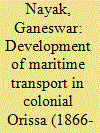

|
|
|
| 3 |
ID:
133396


|
|
|
|
|
| Publication |
2013.
|
| Summary/Abstract |
In this article, the author examines the relationship between economic globalization and international security. The author discusses the increasingly interconnected nature of national economies in the 21st century and argues against dominant thinking that states that the large majority of global trade is based in water shipping. The importance of information flow and systems to the success of trade and transportation is explained. It is argued that the nature of the world economy, largely characterized by bilateral trade agreements, can lead to disruptions in supply chains
|
|
|
|
|
|
|
|
|
|
|
|
|
|
|
|
| 4 |
ID:
112919
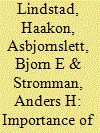

|
|
|
|
|
| Publication |
2012.
|
| Summary/Abstract |
CO2 emissions from maritime transport represent 3.3% of the world's total CO2 emissions and are forecast to increase by 150%-250% by 2050, due to increased freight volumes (Second IMO GHG study, 2009). Fulfilling anticipated climate requirements (IPCC, 2007) could require the sector to reduce emissions per freight unit by a factor of five or six. The International Maritime Organization (IMO) is currently debating technical, operational and market-based measures for reducing greenhouse gas emissions from shipping. This paper also investigates the effects of economies of scale on the direct emissions and costs of maritime transport. We compared emissions from the current fleet (2007), with what can be achieved by increasing average vessel size. The comparison is based on the 2007 levels of trade and predictions for 2050. The results show that emissions can be reduced by up to 30% at a negative abatement cost per ton of CO2 by replacing the existing fleet with larger vessels. Replacing the whole fleet might take as long as 25 years, so the reduction in emissions will be achieved gradually as the current fleet is renewed.
|
|
|
|
|
|
|
|
|
|
|
|
|
|
|
|
| 5 |
ID:
112224
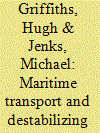

|
|
|
|
|
| Publication |
Sweden, SIPRI, 2012.
|
| Description |
vii, 51p.
|
| Series |
SIPRI Policy Paper No.32
|
| Standard Number |
9789185114719
|
|
|
|
|
|
|
|
|
|
|
|
Copies: C:1/I:0,R:0,Q:0
Circulation
| Accession# | Call# | Current Location | Status | Policy | Location |
| 056469 | 387.5/GRI 056469 | Main | On Shelf | General | |
|
|
|
|
| 6 |
ID:
125422
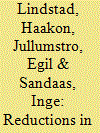

|
|
|
|
|
| Publication |
2013.
|
| Summary/Abstract |
Historically, fuel costs have been small compared with the fixed costs of a bulk vessel, its crewing and management. Today, however, fuel accounts for more than 50% of the total costs. In combination with an introduction of stricter energy efficiency requirements for new vessels, this might make design improvement a necessity for all new bulk vessels. This is in contradiction to traditional bulk vessel designs, where the focus has been on maximizing the cargo-carrying capacity at the lowest possible building cost and not on minimizing the energy consumption. Moreover, the Panama Canal has historically been an important design criterion, while the new canal locks from 2014 will significantly increase the maximum size of vessels that can pass. The present paper provides an assessment of cost and emissions as a function of alternative bulk vessel designs with focus on a vessel's beam, length and hull slenderness, expressed by the length displacement ratio for three fuel price scenarios. The result shows that with slenderer hull forms the emissions drop. With today's fuel price of 600 USD per ton of fuel, emissions can thus be reduced by up to 15-25% at a negative abatement cost.
|
|
|
|
|
|
|
|
|
|
|
|
|
|
|
|
| 7 |
ID:
105763
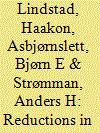

|
|
|
|
|
| Publication |
2011.
|
| Summary/Abstract |
CO2 emissions from maritime transport represent a significant part of total global greenhouse gas (GHG) emissions. According to the International Maritime Organization (Second IMO GHG study, 2009), maritime transport emitted 1046 million tons (all tons are metric) of CO2 in 2007, representing 3.3% of the world's total CO2 emissions. The International Maritime Organization (IMO) is currently debating both technical and market-based measures for reducing greenhouse gas emissions from shipping. This paper presents investigations on the effects of speed reductions on the direct emissions and costs of maritime transport, for which the selection of ship classes was made to facilitate an aggregated representation of the world fleet. The results show that there is a substantial potential for reducing CO2 emissions in shipping. Emissions can be reduced by 19% with a negative abatement cost (cost minimization) and by 28% at a zero abatement cost. Since these emission reductions are based purely on lower speeds, they can in part be performed now.
|
|
|
|
|
|
|
|
|
|
|
|
|
|
|
|
|
|
|
|
|